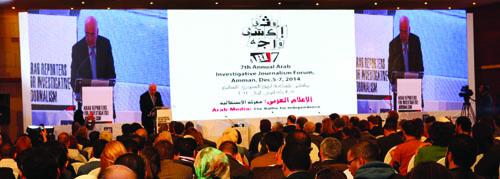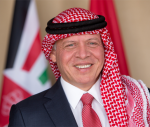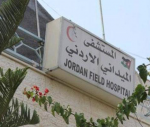You are here
Media experts call for raising ceiling of press freedom
By Mohammad Ghazal , Khetam Malkawi - Dec 07,2014 - Last updated at Dec 07,2014

AMMAN — Media freedoms have declined four years after the “Arab awakening”, not only in the countries that witnessed revolutions but others as well, a former minister and commentator said on Saturday.
Marwan Muasher, former minister of foreign affairs and media, made the remarks at a plenary session titled “The Vagaries of Reform in the Arab World” on the second day of the seventh annual forum for Arab investigative journalists, organised by the Amman-based Arab Reporters for Investigative Journalism (ARIJ).
Muasher cited the Freedom House “Freedom of Press Index”, which indicated that not a single Arab country was classified as completely supportive of media freedoms, with some supporting it partially like Kuwait, Lebanon and Tunisia.
Noting that Jordan is one of the countries that witnessed a decline in media freedoms, he said the Press and Publications Law endorsed two years ago proves this, criticising the legislation for imposing restrictions on freedom of expression through restricting news websites.
Although the Constitution supports freedom of expression, laws have been drafted to restrict this right, Muasher added, citing some Penal Code articles as an example.
He also attributed the lack of pluralism in Arab countries for the restrictions imposed on the media.
At the opening of three-day forum on Friday, experts highlighted the major role media in the Arab world plays in holding authorities accountable.
Noting that media reached a critical stage in the region, Tim Sebastian said imposing restrictions on it will leave decision makers without accountability.
Sebastian, who moderated BBC’s flagship political programme “HARDtalk” for seven years, urged Arab media to focus on delivering facts to their audiences and document violations to protect the interests of societies.
Journalists need to be accurate and follow the ethics of the profession, he added.
Meanwhile, ARIJ Executive Director Rana Sabbagh highlighted the network’s role in training media professionals.
ARIJ has trained over 1,200 journalists and nearly 100 media professors in Jordan, Syria, Lebanon, Egypt, Iraq, Palestine, Yemen, Bahrain and Tunisia. It has also supported the creation of several investigative units at established media houses in Jordan, Lebanon, Palestine and Tunisia.
Sabbagh added that the event, which is the largest since 2005, attracted media experts from many countries.
She also voiced regret that many journalists from Gaza were prevented from travelling for the third consecutive year and thus were unable to participate in the event, along with more than 320 media experts and journalists. Held under the theme, “Arab Media: The Battle for Independence”, the forum includes over 30 panels and training courses on personal safety of reporters in conflict zones, pollution, closed political groups, sports disgraces, off-shore fraud and coverage of human rights abuses in Syria and Iraq.
Related Articles
The seventh annual forum for Arab investigative journalists will open in Amman on December 5, featuring over 30 panels and training courses on various topics.
DEAD SEA — Over 450 regional and international media experts and trainers gathered at the lowest point on Earth on Friday to discuss the fut
AMMAN — The ninth annual forum for Arab Investigative journalists is scheduled to be held at Dead Sea next month, the organisers said on Wed














